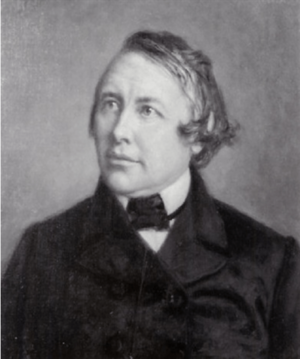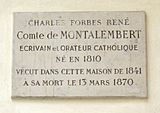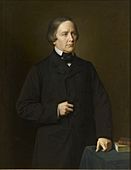Charles Forbes René de Montalembert facts for kids

Charles Forbes René de Montalembert (born April 15, 1810, in London – died March 13, 1870, in Paris) was an important French writer, historian, and a Count. He was a leading figure in a movement called liberal Catholicism, which aimed to combine Catholic faith with modern ideas of freedom.
Contents
Family Background
Charles Forbes René de Montalembert was born in London. His family had roots in both France and Scotland. His father, Marc René, came from a very old French family that had been known for centuries for its members serving in the army and in science. Charles's father fought in battles and later served in the British army.
His mother, Eliza Rose Forbes, was from an old Scottish Protestant family. Charles was their oldest son. When the French monarchy was restored in 1814, his father returned to France and became a peer (a member of the nobility with special rights) in 1820. He then became an ambassador to Sweden, where Charles finished his schooling in 1826.
Early Life and Education
Charles spent his early years in England. His grandfather, who was Protestant, encouraged him to follow his father's Catholic faith. In Paris, he attended the Lycée Bourbon and the Collège Sainte-Barbe. By 1829, he was already writing for a review called Le Correspondant.
In 1830, he traveled to Ireland and met Daniel O'Connell, a famous Irish leader. Charles wanted to help the Irish cause by writing a history of Ireland. However, he soon learned that the British Parliament had passed a law giving more rights to Irish Catholics.
A Young Leader for Freedom
When his father passed away in 1831, Charles de Montalembert was too young to take his seat as a peer. However, his writing and intelligence made him an important person. He believed in liberal ideas, similar to those in England. He wanted the Church to be free from government control. He also spoke out against the government's control over public education. This led to him being charged with teaching without a license in 1832. He famously defended himself in court, using the trial to protest for greater freedoms.
Charles also worked with his friends, Lamennais and Lacordaire, on a newspaper called L'Avenir ("The Future"). In this paper, he strongly supported freedom for Ireland and Poland. Famous writers like Victor Hugo praised his efforts. He even thought about joining the Polish rebels in 1831. He also helped set up the Polish Library in Paris for Polish people who had moved to France.
Challenges and Continued Advocacy
Some people in the Church disagreed with Montalembert's bold ideas. He and his friends traveled to Rome, but they could not convince the Church leaders to change their minds. The Church condemned their ideas in two official letters, Mirari vos (1832) and Singulari Nos (1834). Montalembert accepted the Church's decision.
In 1835, he took his seat in the Chamber of Peers, where his skills quickly made him well-known. He continued to support his early liberal views. In 1848, the government he had always opposed came to an end. He was then elected to the Chamber of Deputies.
Initially, he supported Napoleon III, but he soon disagreed with Napoleon's policies. Montalembert stayed in the Chamber until 1857, when he had to leave public life. Even then, he was seen as a strong opponent of the Empire.
Meanwhile, his liberal ideas also made him enemies among some very traditional Catholics. He used a revived review called Le Correspondant to argue against them.
In 1863, at a big Catholic meeting in Malines, Belgium, Montalembert gave two important speeches about Catholic Liberalism. He strongly believed that education should be independent from the government. He famously said that the government should not force people to believe certain truths, but it should protect their right to practice their chosen religion. This, he argued, was true religious freedom.
Towards the end of his life, Montalembert became more isolated. Politicians disagreed with his support for religious freedom in education, and some Church leaders were unhappy with his liberal views. Charles de Montalembert passed away in 1870.
Personal Life
Montalembert married Mlle de Merode. His daughter later married a well-known Catholic statesman and writer. He was also the brother-in-law of a Belgian church leader and papal statesman, Xavier de Mérode.
Montalembert was a close friend of Edwin Wyndham-Quin, 3rd Earl of Dunraven and Mount-Earl. They traveled together in Scotland in 1862 and Switzerland in 1863.
Important Writings
Besides being a great speaker, Montalembert was also a talented writer. His writing was vivid and strong. He was very interested in the Middle Ages, and his interest was deeply connected to his religious beliefs.
His first historical book, La Vie de Ste Elisabeth de Hongrie (1836), was more than just a history. It was a religious statement that helped bring back interest in the lives of saints. The book was very successful, but Montalembert was not elected to the Académie française (a famous French academy) until 1851.
After this, he focused on a big project about monasticism (the life of monks) in the West. He started by writing about St. Bernard, but later decided to expand his plan. He published the first volumes of his Moines d'occident (Monks of the West) in 1860. This was a powerful work that was admired for its language. The book was not finished when he died, but more parts were found and published later in 1877.
Like another famous writer, Chateaubriand, Montalembert kept detailed notes about the people he met and events he attended.
Here are some of his selected works:
- Défense de l'école libre devant la Chambre des Pairs (1831) (Defense of Free Schools before the Chamber of Peers)
- Histoire de sainte Élisabeth, reine de Hongrie (1836) (History of Saint Elizabeth, Queen of Hungary)
- Du vandalisme et du catholicisme dans l'art (1839) (On Vandalism and Catholicism in Art)
- The Obligation of Catholics in the Matter of Freedom of Teaching (1843)
- Catholic Interests in the Nineteenth Century (1852)
- Political Future of England (1855)
- Les moines d'Occident depuis saint Benoît jusqu'à saint Bernard (1877) (The Monks of the West from St. Benedict to St. Bernard)
Tributes
- Tributes to Charles Forbes, earl of Montalembert
See also
 In Spanish: Charles de Montalembert para niños
In Spanish: Charles de Montalembert para niños
 | Sharif Bey |
 | Hale Woodruff |
 | Richmond Barthé |
 | Purvis Young |



